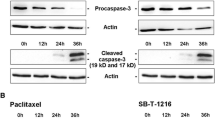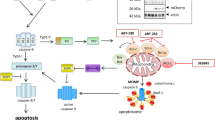Abstract
During the process of death receptor-mediated apoptosis, Bid is cleaved by activated caspase-8, and then cleaved Bid conveys apoptotic signals to the mitochondria by activating Bax/Bak. In the present study, we found that D609 (an antitumor drug with multiple activities) blocks Fas-induced apoptosis. D609 did not interfere with activation of caspase-8 and cleavage of Bid, whereas it blocked cytochrome c release from the mitochondria by inhibiting the activation of Bax and Bak. D609 had no protective effect against apoptosis of SKW6.4 cells, which are typical type I cells. Studies using permeabilized cells revealed that in addition to activation of caspase-8, Fas activated a distinct and D609-sensitive signaling pathway that transmitted signal(s) sensitizing the mitochondria to apoptotic stimuli, and that D609 itself promoted mitochondrial resistance to apoptotic stimuli.







Similar content being viewed by others
References
Amtmann E . (1996). Drugs Exp. Clin. Res., 22, 287–294.
Amtmann E and Sauer G . (1987). Cancer Lett., 35, 237–244.
Antonsson B, Montessuit S, Lauper S, Eskes R and Martinou JC . (2000). Biochem. J., 345 (Part 2), 271–278.
Antonsson B, Montessuit S, Sanchez B and Martinou JC . (2001). J. Biol. Chem., 276, 11615–11623.
Boesen-de Cock JG, Tepper AD, de Vries E, van Blitterswijk WJ and Borst J . (1999). J. Biol. Chem., 274, 14255–14261.
Boldin MP, Goncharov TM, Goltsev YV and Wallach D . (1996). Cell, 85, 803–815.
Cheng EH, Sheiko TV, Fisher JK, Craigen WJ and Korsmeyer SJ . (2003). Science, 301, 513–517.
Cifone MG, Roncaioli P, De Maria R, Camarda G, Santoni A, Ruberti G and Testi R . (1995). EMBO J., 14, 5859–5868.
Desagher S, Osen-Sand A, Nichols A, Eskes R, Montessuit S, Lauper S, Maundrell K, Antonsson B and Martinou JC . (1999). J. Cell Biol., 144, 891–901.
Desbarats J, Birge RB, Mimouni-Rongy M, Weinstein DE, Palerme JS and Newell MK . (2003). Nat. Cell Biol., 5, 118–125.
Eischen CM, Dick CJ and Leibson PJ . (1994). J. Immunol., 153, 1947–1954.
Epand RF, Martinou JC, Fornallaz-Mulhauser M, Hughes DW and Epand RM . (2002). J. Biol. Chem., 277, 32632–32639.
Eskes R, Desagher S, Antonsson B and Martinou JC . (2000). Mol. Cell. Biol., 20, 929–935.
Griffiths GJ, Dubrez L, Morgan CP, Jones NA, Whitehouse J, Corfe BM, Dive C and Hickman JA . (1999). J. Cell Biol., 144, 903–914.
Gross A, Jockel J, Wei MC and Korsmeyer SJ . (1998). EMBO J., 17, 3878–3885.
Hsu YT and Youle RJ . (1998). J. Biol. Chem., 273, 10777–10783.
Kischkel FC, Hellbardt S, Behrmann I, Germer M, Pawlita M, Krammer PH and Peter ME . (1995). EMBO J., 14, 5579–5588.
Kuwana T, Mackey MR, Perkins G, Ellisman MH, Latterich M, Schneiter R, Green DR and Newmeyer DD . (2002). Cell, 111, 331–342.
Lambert C, Landau AM and Desbarats J . (2003). Apoptosis, 8, 551–562.
Li H, Zhu H, Xu CJ and Yuan J . (1998a). Cell, 94, 491–501.
Li P, Nijhawan D, Budihardjo I, Srinivasula SM, Ahmad M, Alnemri ES and Wang X . (1997). Cell, 91, 479–489.
Li Y, Maher P and Schubert D . (1998b). Proc. Natl. Acad. Sci. USA, 95, 7748–7753.
Lin T, Genestier L, Pinkoski MJ, Castro A, Nicholas S, Mogil R, Paris F, Fuks Z, Schuchman EH, Kolesnick RN and Green DR . (2000). J. Biol. Chem., 275, 8657–8663.
Liu X, Kim CN, Yang J, Jemmerson R and Wang X . (1996). Cell, 86, 147–157.
Luo X, Budihardjo I, Zou H, Slaughter C and Wang X . (1998). Cell, 94, 481–490.
Machleidt T, Kramer B, Adam D, Neumann B, Schutze S, Wiegmann K and Kronke M . (1996). J. Exp. Med., 184, 725–733.
Matsko CM, Hunter OC, Rabinowich H, Lotze MT and Amoscato AA . (2001). Biochem. Biophys. Res. Commun., 287, 1112–1120.
Nomura M, Shimizu S, Ito T, Narita M, Matsuda H and Tsujimoto Y . (1999). Cancer Res., 59, 5542–5548.
Paris F, Grassme H, Cremesti A, Zager J, Fong Y, Haimovitz-Friedman A, Fuks Z, Gulbins E and Kolesnick R . (2001). J. Biol. Chem., 276, 8297–8305.
Scaffidi C, Fulda S, Srinivasan A, Friesen C, Li F, Tomaselli KJ, Debatin KM, Krammer PH and Peter ME . (1998). EMBO J., 17, 1675–1687.
Schutze S, Potthoff K, Machleidt T, Berkovic D, Wiegmann K and Kronke M . (1992). Cell, 71, 765–776.
Shimizu S and Tsujimoto Y . (2000). Proc. Natl. Acad. Sci. USA, 97, 577–582.
Shinohara H, Yagita H, Ikawa Y and Oyaizu N . (2000). Cancer Res., 60, 1766–1772.
Wallach D, Varfolomeev EE, Malinin NL, Goltsev YV, Kovalenko AV and Boldin MP . (1999). Annu. Rev. Immunol., 17, 331–367.
Wei MC, Lindsten T, Mootha VK, Weiler S, Gross A, Ashiya M, Thompson CB and Korsmeyer SJ . (2000). Genes Dev., 14, 2060–2071.
Wei MC, Zong WX, Cheng EH, Lindsten T, Panoutsakopoulou V, Ross AJ, Roth KA, MacGregor GR, Thompson CB and Korsmeyer SJ . (2001). Science, 292, 727–730.
Wiegmann K, Schutze S, Machleidt T, Witte D and Kronke M . (1994). Cell, 78, 1005–1015.
Wolter KG, Hsu YT, Smith CL, Nechushtan A, Xi XG and Youle RJ . (1997). J. Cell Biol., 139, 1281–1292.
Yang X, Khosravi-Far R, Chang HY and Baltimore D . (1997). Cell, 89, 1067–1076.
Yethon JA, Epand RF, Leber B, Epand RM and Andrews DW . (2003). J. Biol. Chem., 278, 48935–48941.
Yin XM, Wang K, Gross A, Zhao Y, Zinkel S, Klocke B, Roth KA and Korsmeyer SJ . (1999). Nature, 400, 886–891.
Zhang L, Shimizu S, Sakamaki K, Yonehara S and Tsujimoto Y . (2004). J. Biol. Chem., 279, 33865–33874.
Zhou D, Lauderback CM, Yu T, Brown SA, Butterfield DA and Thompson JS . (2001). J. Pharmacol. Exp. Ther., 298, 103–109.
Acknowledgements
We thank Drs K Sakamaki and S Yonehara for kindly providing caspase-8-deficient MEFs. This study was supported in part by a grant for Scientific Research on Priority Areas, a grant for Center of Excellence Research, a grant for the 21st century COE program, and a grant for Scientific Research from the Ministry of Education, Science, Sports, and Culture of Japan.
Author information
Authors and Affiliations
Corresponding author
Rights and permissions
About this article
Cite this article
Zhang, L., Shimizu, S. & Tsujimoto, Y. Two distinct Fas-activated signaling pathways revealed by an antitumor drug D609. Oncogene 24, 2954–2962 (2005). https://doi.org/10.1038/sj.onc.1208388
Received:
Revised:
Accepted:
Published:
Issue Date:
DOI: https://doi.org/10.1038/sj.onc.1208388
- Springer Nature Limited




